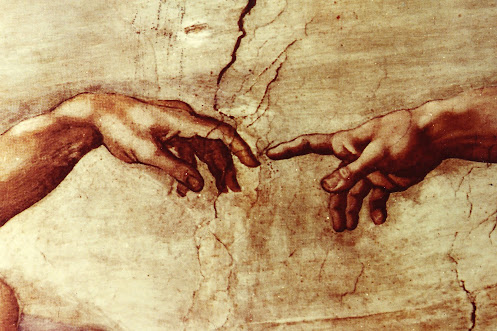Luke 2:1-20 In those days a decree went out from Emperor Augustus that all the world should be registered. This was the first registration and was taken while Quirinius was governor of Syria. All went to their own towns to be registered. Joseph also went from the town of Nazareth in Galilee to Judea, to the city of David called Bethlehem, because he was descended from the house and family of David. He went to be registered with Mary, to whom he was engaged and who was expecting a child. While they were there, the time came for her to deliver her child. And she gave birth to her firstborn son and wrapped him in bands of cloth, and laid him in a manger, because there was no place for them in the inn.
In that region there were shepherds living in the fields, keeping watch over their flock by night. Then an angel of the Lord stood before them, and the glory of the Lord shone around them, and they were terrified. But the angel said to them, "Do not be afraid; for see-- I am bringing you good news of great joy for all the people: to you is born this day in the city of David a Savior, who is the Messiah, the Lord. This will be a sign for you: you will find a child wrapped in bands of cloth and lying in a manger." And suddenly there was with the angel a multitude of the heavenly host, praising God and saying,
"Glory to God in the highest heaven,
and on earth peace among those whom he favors!”
When the angels had left them and gone into heaven, the shepherds said to one another, "Let us go now to Bethlehem and see this thing that has taken place, which the Lord has made known to us." So they went with haste and found Mary and Joseph, and the child lying in the manger. When they saw this, they made known what had been told them about this child; and all who heard it were amazed at what the shepherds told them. But Mary treasured all these words and pondered them in her heart. The shepherds returned, glorifying and praising God for all they had heard and seen, as it had been told them.
Reflection Have you ever wondered why we must celebrate Christmas every year? Perhaps it is because we have not yet fully given birth to the living, breathing, human Christ. In truth everyone of us is pregnant with the extraordinary Christ life potential but rarely do we allow it to manifest fully through us. Until all that we say and all that we do is an expression of the Christ present with us, the Incarnation of humanity will be incomplete and so, we need Christmas.
The revelation of the Christ on earth did not come with flashing neon lights and snappy slogans, did not burst through space on a rocket or float to earth on a stairway of clouds. The revelation of Divine Presence came in the flesh and bloody birth of the peasant Mary’s child arriving just like our wet and wrinkly newborns.
Reflecting on the Christmas blessing the twentieth century theologian Carl Rahner puts it this way. “(It) is not the deepest blessing of Christmas … that (Jesus) was born as the infant child of Mary but rather that he was born to become fully human, and with the promise that we too might be so.” In other words, Divinity is realized in the fullness of humanity and the blessing of Christmas depends on all of us becoming fully human.
What does it mean to be fully human? I believe it means to be precious and vulnerable, humble and unique, and blessed to be a blessing, just like Jesus; the infant, the itinerant teacher, friend, rabbi and rebel, loved and hated, feared and revered, delighted, frustrated and aggrieved. In our preciousness, our vulnerability and all of our broken places we are blessed and meant to be a blessing, laboring to make Divinity manifest by becoming fully human.
As Rahner attests, the historical event of the birth of Jesus points to something more, to ‘the promise that we too might be so.” This is the blessing of Christmas. Do we dare to receive and allow it to manifest through us?
The time of expectation and waiting is over. For us who have prepared our hearts Jesus is born again this and every moment. Our present moment is full of Jesus, the Christ child, God with us. It is of this that the prophet Isaiah sings to God; “The people who walked in darkness have seen a great light; those who lived in a land of deep darkness— on them light has shined.”
The time of searching and waiting for God is ended. We are no longer in the dark, no longer seekers. We are believers, receivers and manifesters. All that remains for us to do is put aside our complaints, our multitasks and distractions, to cradle the blessing that makes each one of us fully human.
This is the heart and the height of Christmas. Being full of Jesus we are fully human. Amen.
Merry Christmas!
If you find this post to be meaningful please share by clicking on icons below. Thank you.










